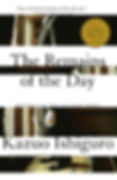Petrichorium

How Kazuo Ishiguro's The Remains of the Day Predicted Brexit
May 29
4 min read
0
15
0
People often overlook how politics can impact authors and the literature they write. The impact of the politics and philosophy of a country is powerful in many subtle ways. Kazuo Ishiguro is natively Japanese and grew up in the U.K. His background forms the basis for many of his novels, including The Remains of the Day. The novel is a lens through which to predict future governmental shifts in Britain, notably Brexit. Ishiguro highlights a key theme in this novel: nostalgia, which helps to predict Brexit.
The Remains of the Day does not simply predict the rise of nostalgia in Great Britain today. It also diagnoses the exact moment nostalgia was born, paving the way for Brexit.
The Remains of the Day takes place in the 1950s, where Stevens, the main character, is taking a countryside road trip reflecting on his time spent as a butler at Darlington Hall in the English countryside.
The scene is set: nostalgia and regret bubble up throughout the trip. These feelings overwhelm Stevens, as he does not want to face what he’s left with – as nostalgia and regret become the setting sun or whatever remains at the end of the day. Neither does the British Empire: "The sun never sets on the British Empire." It sounds eerily familiar, doesn’t it?

The novel showcases a specific type of nostalgia known as restorative nostalgia. Restorative nostalgia occurs when citizens desire to bring back the former glory of their empire. It is the idealized form of the empire, not the actual empire of old, though.
Nostalgia is a powerful feeling that drives people to do various acts in a quest to fill the gap that was created. The Remains of the Day predicts the coming of nostalgia within England. It evokes a longing for the old-world, imperialist Britain that once was. Restorative nostalgia manifests itself in the passage of Brexit.
The novel helps us understand Brexit by showing how nostalgia grows into a powerful force. Symbolically, Stevens represents the British people pre-Brexit, the modern-day Brits who desire to restore the Great British Empire. Stevens experiences such a strong sense of displacement that it motivates him to wish for a return to what he perceives as the good old days.
Stevens, in part, also represents the Conservative Party from the 1980s, when Margaret Thatcher was Prime Minister. During that time, nostalgia for imperial Britain and Neoliberalism was strong. As a Thatcherite cog in the machine, Stevens knows who and what he is to the British Empire. Stevens knows that the demand for butlers like himself for halls like Darlington is declining, like Britain's decline.

The novel is set perfectly in a time where it spurs on the rise of the nostalgia that Brexiteers experience. Leave voters wished for the powerful glory days of the Great British Empire. They wanted to preserve the traditions and culture while allowing citizens to benefit from trickle-down wealth via the economy. Leaving the European Union is also about isolationism, nationalism, and jobs because Leave voters fear losing their purpose and national identity.
The use of allegory and metaphors both forecasts societal and political changes. In The Remains of the Day, Stevens is a metaphor for Leave voters who desire a return to the glory days of the Great British Empire. The novel itself constitutes a metaphor for the desire to return to it as well. They don't want the sun to set on the Empire yet. They do not want to face the remains of the day.
Historical incidents impact authors and their writing, reflecting that specific time and place's political climate. Undoubtedly, this is why literature can be a predictor of political change. Literature can affect how history plays out and predict events like Brexit or Trump's rise to power in the 2016 and 2024 Presidential elections. The past often predicts the future, even as people strive to avoid repeating it.
Works Cited:
Pritting, Shannon. "Book Review: Literature and Politics Today: The Political Nature of Modern Fiction and Drama." RUSQ: A Journal of Reference and User Experience [Online], 55.1 (2015): 74-75. Web. 22 Jan. 2025.
Ishiguro, Kazuo. The Remains of the Day. Vintage Books, 1990.
Saramandi, Ariel. “How 'The Remains of the Day' Helped Me Understand Brexit and Trump.” Electric Literature, 25 Mar. 2019, electricliterature.com/how-the-remains-of-the-day-helped-me-understand-brexit-and-trump/.
Monbiot, George. “Neoliberalism – the Ideology at the Root of All Our Problems.” The Guardian, Guardian News and Media, 15 Apr. 2016, www.theguardian.com/books/2016/apr/15/neoliberalism-ideology-problem-george-monbiot.
Mauldin, John. Friedman, George. “3 Reasons Brits Voted For Brexit.” Forbes, Forbes Magazine, 20 Apr. 2018, www.forbes.com/sites/johnmauldin/2016/07/05/3-reasons-brits-voted-for-brexit/#5f709b401f9d.
Hutton, Robert. “The Roots of Brexit.” Bloomberg.com, Bloomberg, 31 Jan. 2020, www.bloomberg.com/quicktake/will-uk-leave-eu.
Swift, Graham, and Kazuo Ishiguro. "Kazuo Ishiguro." BOMB, no. 29 (1989): 22-23. Accessed April 23, 2020. www.jstor.org/stable/40423890.
Su, John. “Ethics and Nostalgia in the Contemporary Novel.” Cambridge UP, 2005.
Boym, Svetlana. “The Future of Nostalgia.” Basic Books, 2001.
Statesman, New. “Leader: Kazuo Ishiguro, Brexit and Global Britain.” Leader: Kazuo Ishiguro, Brexit and Global Britain, 11 Oct. 2017, www.newstatesman.com/politics/uk/2017/10/leader-kazuo-ishiguro-brexit-and-global-britain.
Lang, James M. “Public Memory, Private History: Kazuo Ishiguro’s The Remains of the Day.” Clio 29 (2), 2000.
Liacos, Rachel. "Capstone Essay: Brexit, The Remains of the Day by Kazuo Ishiguro, and Nostalgia for Empire." 2020.

